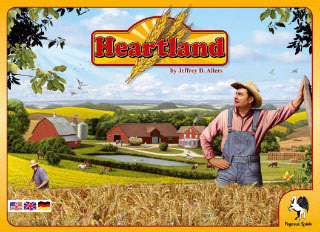Heartland
Products title that includes 'PRE-ORDER' is subject to our Pre-order Policy
Couldn't load pickup availability
Delivery and Shipping
Delivery and Shipping
For more details, please refer to our Shipping and Order Information.
Pre-Order Policy
- Pre-order items are charged at the time the order is placed.
- Prices for pre-order items are subject to change based on final landed costs.
- If the final price is lower, the difference will be refunded to the customer in the form of store credit.
- If the final price is higher, customers will be given the option to either:
- Pay the difference, or
- Cancel the item for a full refund.
- Orders containing pre-order items will be placed on hold until all items in the order are available.
- Once all items have arrived and pricing remains unchanged, the order will be automatically shipped.
- Pre-orders are fulfilled on a first-come, first-served basis.
- If a pre-ordered item becomes unavailable (e.g., the publisher cancels the product), a full refund will be issued.
- Pre-orders may be cancelled and refunded by customers or the store.
- For transactions that are no longer eligible for direct refunds due to payment processor limitations, a store credit will be issued instead.
Description
Description
| Designer | Jeffrey D. Allers |
| Publisher | Pegasus Spiele |
| Players | 2-5 |
| Playtime | 60 mins |
| Suggested Age | 8 and up |
| Additional Info | BoardGameGeek (Images, Videos, Reviews) |
West of the Mississippi, the grasslands of Middle America contain some of the richest farm land in the world, producing corn, soybeans, wheat, hay, and livestock. Purchased from France as part of the Louisiana Territory in 1803, the region was divided into square mile plots for the settlers from the east. In this game, players take the role of these settlers, developing the plots of land and establishing farms in America’s “Heartland.”
The game, entitled “Eine Frage der Ähre” in German, is a three-dimensional tile-laying game. Each tile contains two types of crops to be planted as well as a certain number of “barnyard points.” When placing tiles, players must always choose between scoring immediate “harvest” (victory) points or developing their farms through the barnyard points, which will provide victory points over the longer term. In addition, there is a race to the top of each barnyard point track in order to acquire the most valuable animals for the farm. Players may also “rotate crops” by using their tiles to cover up fields that bring their opponent’s points, possibly expanding their own farms in the process. This translates into an hour-long game aimed at families and gamers with multiple paths to victory.


